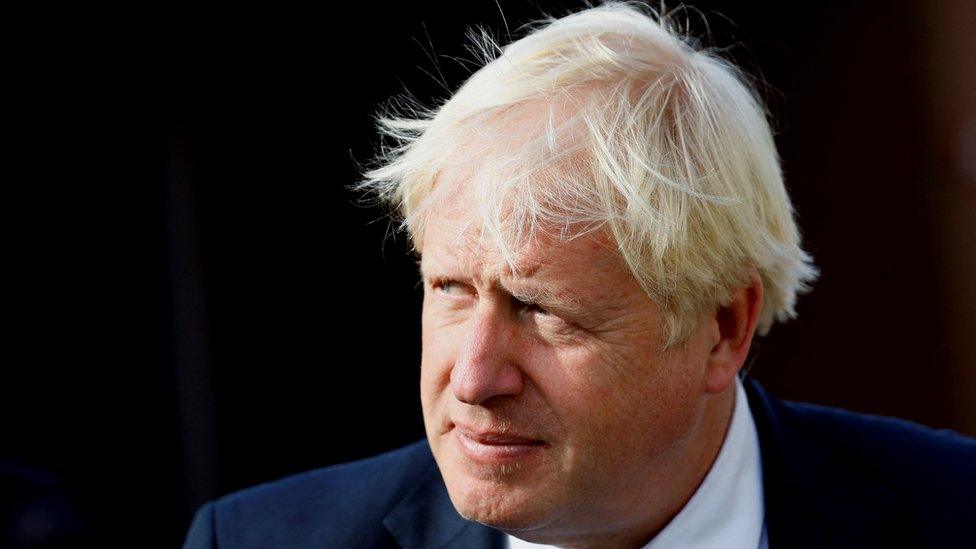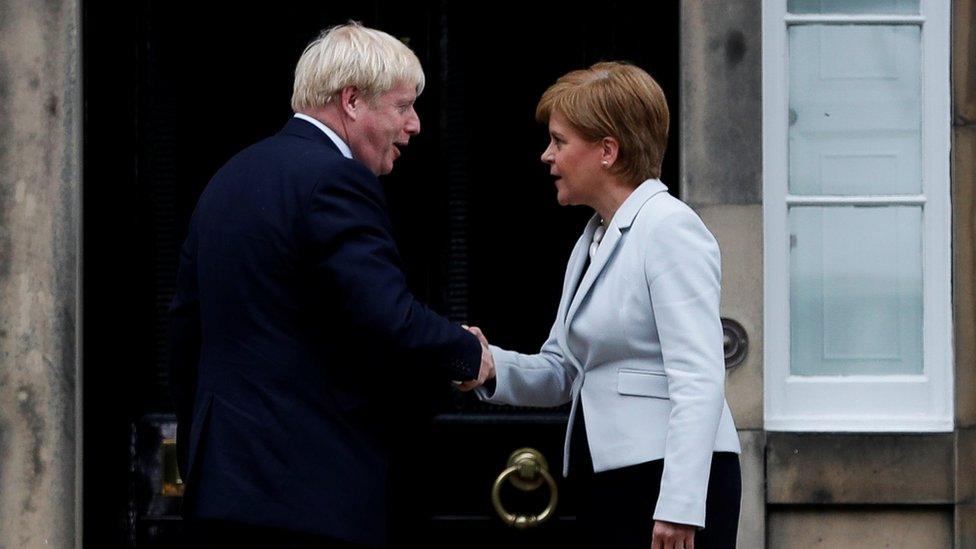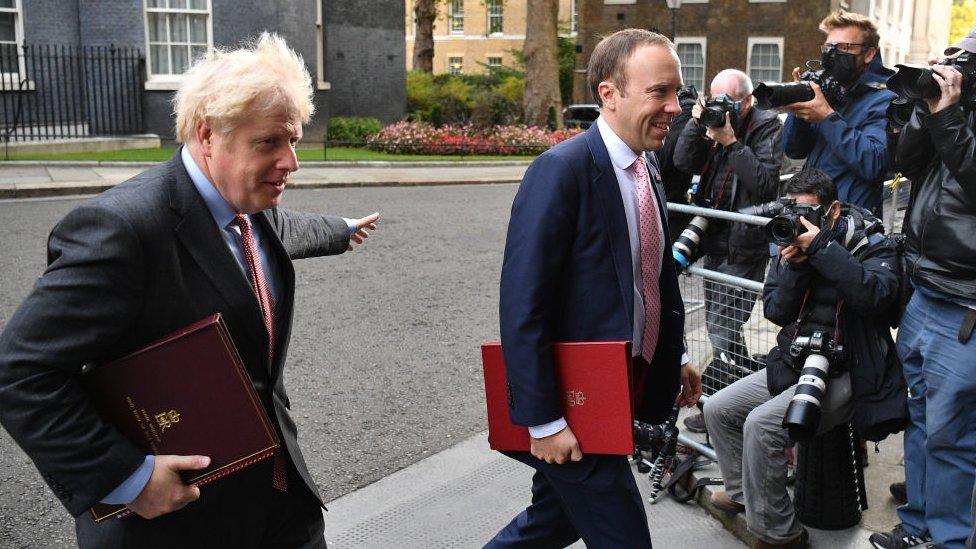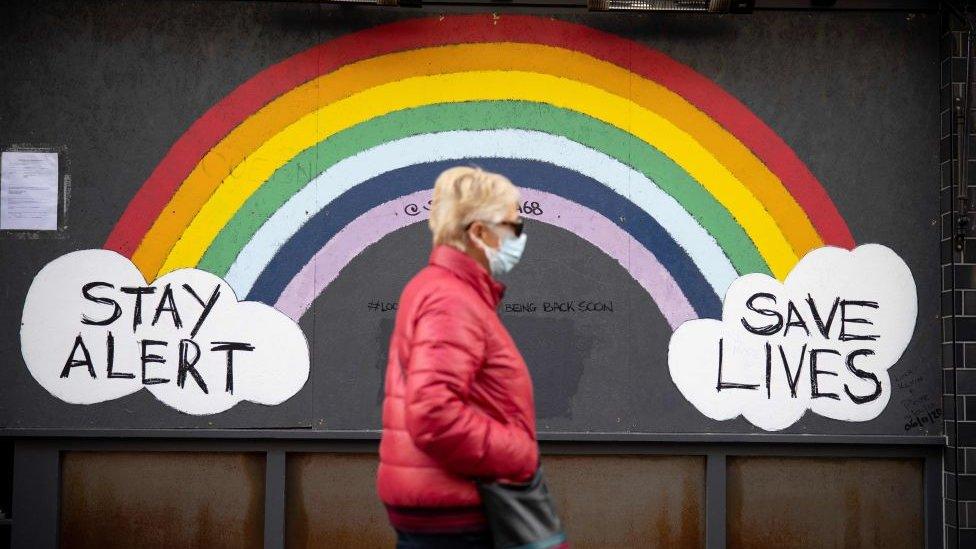Covid: Boris Johnson refused talks with Drakeford and Sturgeon
- Published

Boris Johnson said working closely with Welsh, Scottish and NI leaders make the UK look like a mini-EU
Boris Johnson thought it was "wrong" for the prime minister to hold regular meetings with Mark Drakeford and Nicola Sturgeon during the pandemic.
The comments have been revealed in his evidence to the Covid inquiry.
Wales' first minister had been frustrated at the number of meetings he had with the Westminster government.
But Mr Johnson feared working closely with first ministers could make the UK look like a "mini-EU of four nations".
"That is not, in my view, how devolution is supposed to work," he said.
Wales, Scotland and Northern Ireland have their own governments which have different levels of control over their own affairs.
Sometimes known as the devolved administrations (DAs), all three had their own lockdown rules which differed more from the UK government's in England as the pandemic went on.
After initially chairing emergency COBR meetings with the heads of three nations at the beginning of the pandemic, Boris Johnson passed the responsibility on to Michael Gove, the Chancellor of the Duchy of Lancaster.
In written evidence to the inquiry Mr Johnson said: "I did chair some of the four nation COBRs, but I was content to let Michael lead."
Apart from the workload, he said there were "two good reasons" for this, "one of principle and one practical."
"It is optically wrong, in the first place, for the UK prime minister to hold regular meetings with other DA first ministers, as though the UK were a kind of mini-EU of four nations and we were meeting as a 'council' in a federal structure."
Federalism is where power is more equally divided between central and regional governments.
That is not the case in the UK, where ultimate power still lies with the central government in Westminster despite the three devolved nations being permitted to make their own decisions.
Mr Drakeford wrote to the UK government in April 2020 asking for a "regular rhythm" to meetings between the devolved nations and the Westminster government.
But it is clear there was a difference of opinion within government about how to deal with the devolved authorities.
Ministers were concerned that regular meetings would not necessarily mean that the devolved administrations would agree with their approach to Covid.
There was a warning in one meeting of UK government ministers, where Mr Drakeford's request was discussed, that regular meetings with Wales, Scotland and Northern Ireland could be a "potential federalist trojan horse".
In minutes of the meeting, the then-Secretary of State for Wales, Simon Hart, was "nervous" about excluding the three countries from decisions, and thought they as a government "could possibly engage more than we are at the moment".
But it noted that he did think that Mr Drakeford was "positioning himself for next year's assembly elections".
The Scottish Secretary, Alistair Jack, thought that "working at official level would be better" than with the heads of government as it "would avoid Scottish FM grandstanding".
'Fear of leaks'
In WhatsApp messages, Boris Johnson's former adviser, Dominic Cummings, advised the prime minister to chair daily meetings from Downing Street's Cabinet Room and not "with the DAs [devolved administrations] on the [expletive] phone all the time either so people can't tell you the truth".
Speaking to the Covid inquiry on Monday, politics expert Professor Ailsa Henderson of Edinburgh University said there was a "fear of federalism, there is a fear of leaks", that the UK government perceived a "self-serving nature to the motives of the devolved administrations".
She said the minutes of the meeting of UK government ministers was "the most remarkable document I have read in a number of years"
There was no suggestion, she said, "that it might improve decision-making if more voices from more parts of the UK were included".

Boris Johnson met then-Scottish First Minister Nicola Sturgeon at Bute House in July 2019
Boris Johnson's believed that the divergence in policies between the four nations became "a growing presentational problem".
In his written testimony, he said he regrets not using civil contingencies legislation rather than public health legislation for Covid laws.
This would mean that only the UK government could have decided on the rules around Covid, preventing the devolved governments from pursuing their own policies.
He says there was "always a risk" that the devolved governments "would diverge and choose a more restrictive measure, or one that was perhaps different for the sake of being different".
In his written testimony, the former Welsh health minister Vaughan Gething said that the meetings between governments were not an "open discussion that treated other governments as equals".
- Published3 October 2023

- Published3 October 2023

